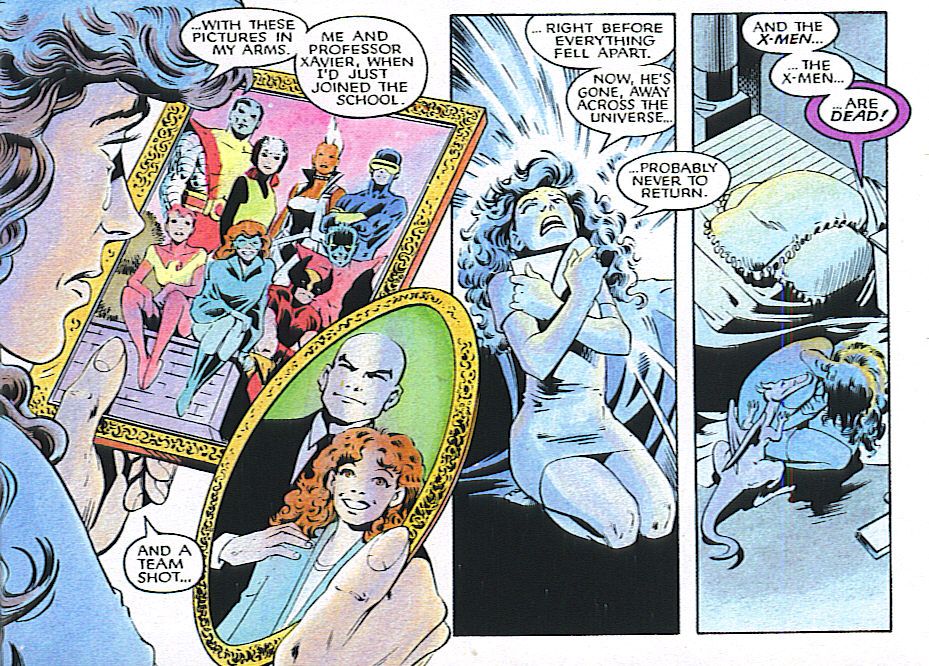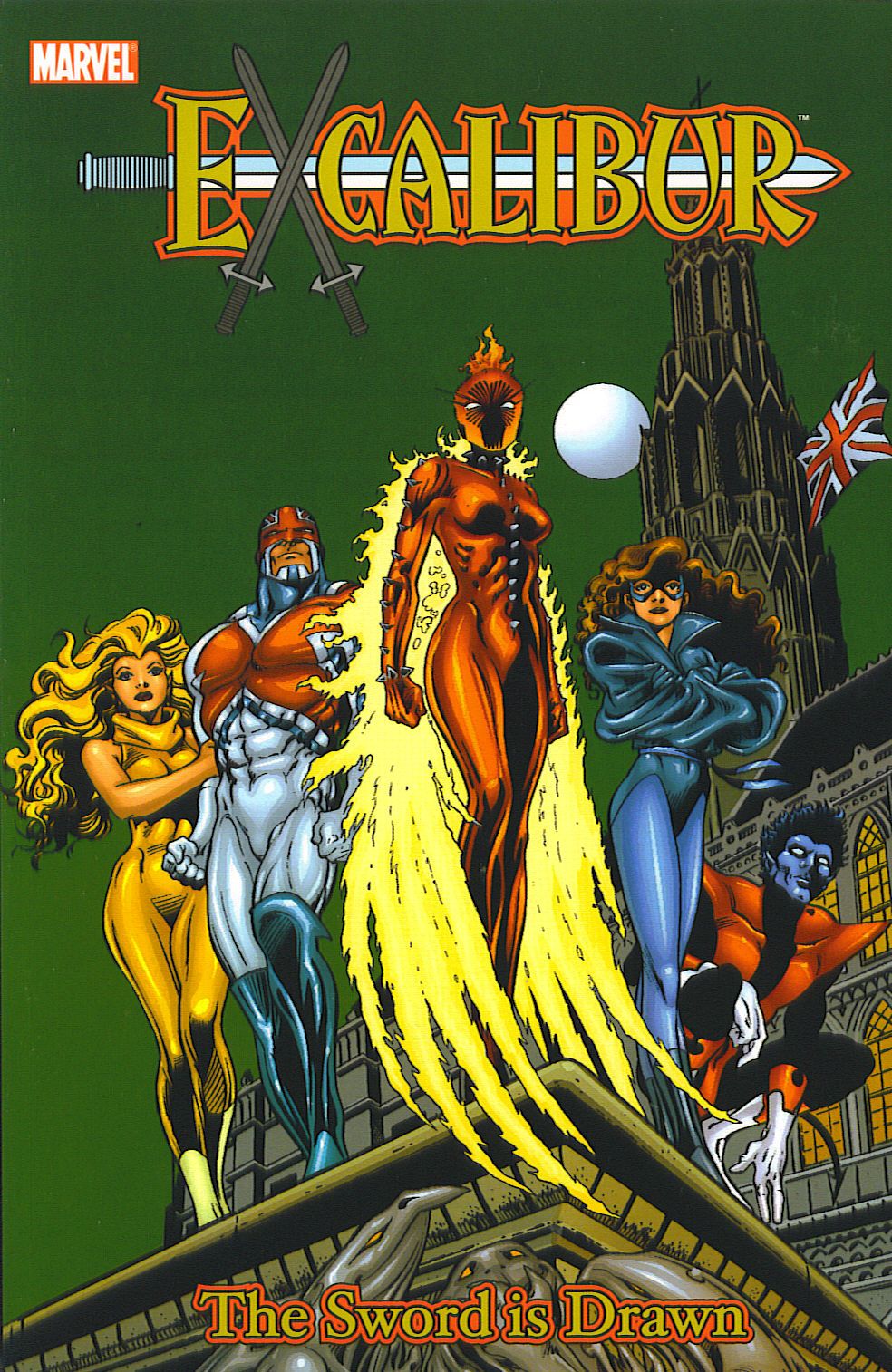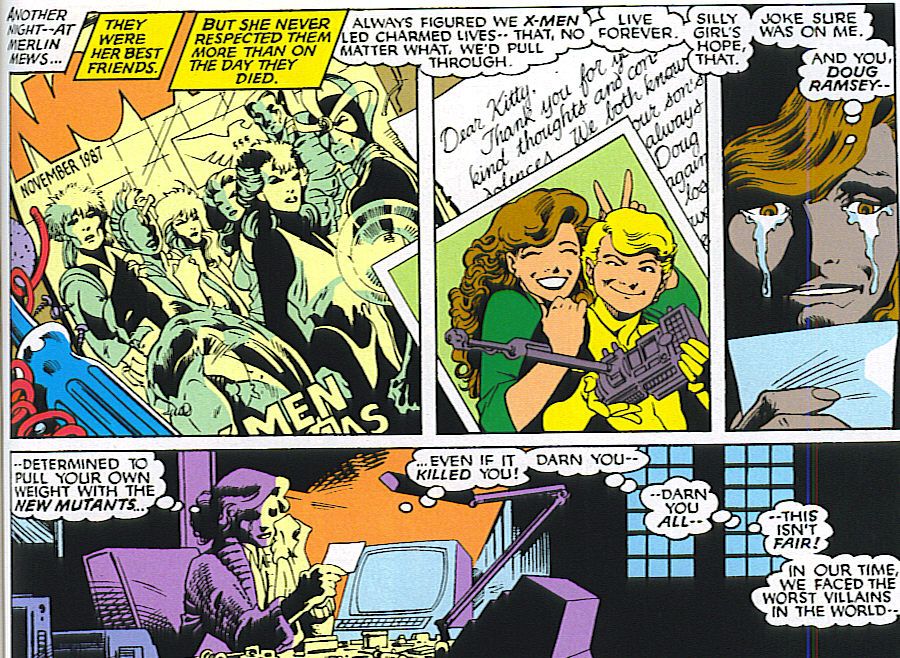I don't think it's any secret that I am terribly sentimental. Yes, it's true. I can think of few things more excellent than cruising down the highway in a convertible with the sun sinking low behind me and my woman by my side while Styx's Paradise Theater plays on the 8-track. Come on, sing along: "We'll take the best, forget the rest, and someday ... we'll ... find ..."
But what, pray tell, has this to do with comics? Well, that's a fine question. Before you all run off to play your own copy of Paradise Theater (doesn't everyone own that record?), I will explain. First, by saying I recently bought a copy of The Sword Is Drawn, the first Excalibur trade paperback, collecting the special that launched the team and the first five issues of the monthly series.
How can you not love this book? Claremont before he got sucky, Alan Davis' gorgeous pencils, warwolves, the Technet, the Juggernaut, the Crazy Gang, Arcade ... all kinds of comic book goodness!
But that's not what got me thinking of sentimentality and how it refers to comics. What got me was this sequence, early in the special:
Kitty has just had a dream about the X-Men (the absolute excellent group, with Rogue, Psylocke, Dazzler, Longshot, Havok, Storm, Colossus,and Wolverine - what a freakin' great assemblage) and when she wakes up, she recalls that they are dead. Remember that? When the Marvel U. actually believed the X-Men were dead? Good times. She, of course, is on Muir Island, because during the Mutant Massacre she was injured to the extent that she was phasing almost all the time - it was only with intense concentration that she could remain solid. So the X-Men sent her to Moira's to recuperate, and while she was there, the X-Men went to Dallas with Forge and ... well, died. But not really! But at this point, everyone else thought they were still dead. Alles klar?
I read this book years ago, but haven't read it in a while, and this scene, in conjunction with other parts of the book, especially after Kitty hooks up with Kurt and Rachel to eventually form Excalibur with Brian and Meggan, made me sentimental. And then it made me think of why comics can be such a wonderful art form. And then it made me think of a shared universe.
Now, this isn't some rant about continuity and how it must be respected above all else. I don't really care one way or another if continuity is respected or not. Sometimes it bugs me that writers and editors are too lazy to go back and read something that happened in the past and not blatantly contradict it, but sometimes it doesn't bug me all that much. If the story is good, I'm willing to overlook a lot of continuity errors. It doesn't bug me that nobody hears Charles Foster Kane's final word, after all.
But I'm not talking about that. I'm talking about something that has been largely lost from both the Marvel and DC Universes, and that's an idea that the characters have ahistory. Today, if writers do like continuity, that's fine, but they seem to use continuity as both a crutch and a bludgeon. It becomes a crutch because they try to fit every little aspect of the character's history into their story at the expense of the story, and a bludgeon because they beat us over the head with it to make sure we know that they know far more about the character than we ever could and nyah-nyah-nyah! To be fair, fans do this as well - I'm amazed and a bit daunted by the ridiculous knowledge that many of our readerspossess about the comics they love. So the fans and the writers become trapped in a vicious cycle of one-upmanship, and the books themselves suffer.
What I am talking about is something that Claremont, when he was lord and master of every X-book in the land, was very good at. The characters grew and remembered their past and it influenced their decisions, even if only slightly. Claremont didn't allow their pasts to get in the way of a good story, so he only brought it up if it helped the plot forward, but the point is: the X-Men and the ancillary books were all part of a big family, and if Illyana got peeved at Professor Xavier in the pages of New Mutants, the next week in Uncanny X-Men she might drift by and mention that she's still pissed. A reader of the latter book but not the former might be confused momentarily, but it wasn't all that essential to the plot, plus it was a reward for those who did read both. The books didn't cross over with each other, and you could be perfectly happy reading only one, but the idea that these events were happening at the same time and that the characters would act consistently was comforting. And it's largely gone by the boards.
There are plenty of reasons for this, and I'm not saying it's the worst thing in the world, but occasionally it bugs me. This is one of the reasons I wish comic book characters would age, however slowly. With the X-Men (I know, I'm using them as an example, but it could refer to any character), we always had a sense that these people were slowly growing up, and occasionally they even moved on. Back then it was a big deal for Cyclops to leave the team in issue #138, because it felt like a watershed event in the lives of the X-Men, a true "graduation." Now, characters show up almost randomly, because Writer X happens to want to use them. The proliferation of the number of mutant titles mean that there is very little coherence between them. The hiring of "superstar" writers with only a passing knowledge of Marvel or DC history means that editors are pushed aside, and we get stories with characters we've known for years acting completely unlike they have ever acted (this was my main objection to Identity Crisis, if you'll recall - not that the story was bad, but that the story was bad because it starred DC icons). After all, we musn't insult the talent! One of the biggest problems I have with the atrocious Scott-Emma pairing is not that it's dumb (although it is mind-numbingly stupid), but the way it played out (and this is Morrison's fault, since he obviously had a big hard-on for Emma). Scott "cheats" on Jean. Okay, I get that. I don't like it, but I get it. Then Jean dies. Does Scott mourn? At all? This is the great love of his life - he's been with her pretty much since they were both 17, except for when she was, you know, dead. But he doesn't mourn her - he just jumps in bed with Emma. And Jean is forgotten. Yes, we had that horrible mini-series about the Phoenix, but essentially, it's as if she never existed. In "real time," it can't be more than a few months since Jean died. Yet we're supposed to believe that Scott would simply jump in bed with Emma and never mention his wife again. I don't buy it.
Again, this is not to say that every writer should be slaves to continuity. But there is a balance, and it seems, too often, that either the history of characters is ignored or, at the other extreme, wallowed in. There's very little in mainstream superhero comics that is comforting. What's that, you say? We shouldn't be comforted when we read mainstream superhero comics? Why not, say I? There is something very comforting about reading a book that has been published for years, and you read it when you were a kid and can pick it up again 20 years later and say, "Hey, these are old friends." That's not to say they shouldn't change. But just like a friend you had in high school and you might not have seen in 10-15 years, they should be recognizable, and they should remember their past. In this trade paperback, Kitty, Kurt, and Rachel have lost good friends, but Brian and Meggan have lost someone too - Betsy, who is Brian's sister. And you don't need to knowthat Claremont is using old Captain Britain foes - whether he created them or Alan Moore or even Davis, when he was writing the book, I don't know - toenjoy these stories. If you do know about them, that's fine, and youcan smile about it.But it's not necessary. The connections between the various characters in the Marvel and DC Universe are what I miss, occasionally, and I don't think it would be too hard to acknowledge those connections every so often. (And no, what Whedon is doing doesn't count. There's very little emotional development in the book, at least from what I can tell. I could be wrong.)
This is, of course, what our Other, Probably Cooler Greg was talking about last week. Well, to a certain degree. He wondered why the Big Two pander to people like him, while it appears I am saying they don't pander enough. But that ain't so. Yes, this would be pandering to the hard core fan base, but it a much more subtle way than what he was talking about. At least I think so. And this points up a much more interesting point about mainstream superhero comics in general. There is certainly a way to draw in a new audience, and it isn't with the sprawling, everyone-knows-everyone kind of thing I'm talking about. Runaways is a good example. It's a kid-friendly book where one doesn't need to know everything about the Marvel U., but it's still set firmly in the Marvel U. (well, in vol. 1 one didn't need to know everything or anything about the Marvel U., despite the presence of Cloak and Dagger, but that might have changed with vol. 2). A couple of my favorite mini-series from last year, Livewires and Gravity (don't laugh - they were both entertaining and heroic), are other good examples, despite being a bit more tied into the Marvel U.These are the books that Marvel shouldbe pushing to kids, because they are very entertaining books all on their own. Marvel should not be pushingany of the core titles on kids, or even ones that are part of, say, the X-Universe subsection, because there is too much continuity there.However, the glorious thing about comics is - they're addictive. And kids have addictive personalities. If they read Gravity and see Spider-Man, they might buy a Spider-Man comic. Yes, it might suck, but they might get sucked in, because it might contain a scene that's cool. Then they might seek out other Marvel titles, until they are ensconcedin the warm embrace of an all-consuming continuity trap. Then they can't escape!
That's all just speculation, however. My point (and I do have one) is that mainstream superhero comicspresent the readers with a remarkably unusual phenomenon. Many people decry continuity,and they point to "real" literature and say you wouldn't want Sherlock Holmes showing up in Dracula, because that's stupid. Well, sure.But comics are unique in thatregard, and that's what makes them cool. These days, when I read a Marvel book or a DC book, I judge it on its merits, and that's fine. Rarely, however,do I get the sense of it fitting into the grand tapestry that these companies have built up over the years. If it does (like Infinite Crisis), it's a mess. There's nothing wrong withBruce Wayne stopping for one panel and remembering Vesper Fairchild and having a look of sadness cross his face.He does it all the time with Jason Todd, after all. The X-Men just fought some Skrulls in the latest issue. Someone could recall that weird late-1990s run with Alan Davis on both books in which something happened with the Skrulls (you'll have to excuse me,as I have blotted thoseissues from my memory). Scott could weep about Jean once in a while. Flash Thompson could show up and say hi to Peter Parker. I'm not talking about super-heavy continuity, just random nods to the past. It wouldn't be difficult, and it would be a nice hat tip to the people who love the whole shared universe concept.
Of course, I'm old. And sentimental. So Iprobably should shut it.



